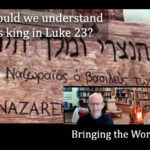The lectionary readings for Trinity 2 in Year C are Galatians 5.1, 13-25 Luke 9.51-end.
In Galatians 5, Paul explores the meaning of freedom in Christ. This is not freedom to indulge the desires of our sinful human nature (the ‘flesh’) but the freedom to fulfill the law in obedience to God by the power of the Spirit.
Paul uses some startling language to express what this means. In love, we are to become ‘slaves’ to one another. Paul continues to address divisions, especially between those claiming that followers of Jesus must obey the law and others, contrasts the ‘works of the flesh’ with the (singular) ‘fruit of the Spirit’, and shows that the new life given by the Spirit can only be lived by the power of the Spirit.
For the video on the gospel reading, Luke 9.51f, where the disciples want to call down fire on a Samaritan village, and Jesus talks about the cost of discipleship, see here.
 Buy me a Coffee
Buy me a Coffee




























Thankyou James and Ian, very stimulating.
A great start to the week!
Liberty and freedom!
Freedom is our standing,Christ has set us free
Liberty is our state arising from our freedom which
is the work of the sovereign Spirit.
It has occured to me that we need better understanding
of the Person and Work of the Spirit.
He is the artist and articifer of the Glory and glorifying of Christ
not only for us but also in us.
Building us up into a Holy Temple, a habitation of God.
as we take care how we build on the foundation laid in Christ Jesus.
It is interesting to note that the first mention of a man
“filled” with the spirit is, Bezaleel the son of Uri, [Ex.31]
If you recall he was the artificer, builder and furnisher
of The Tabernacle planned by God and given to Moses.
“And the Lord spake unto Moses, saying, See, I have called by name Bezaleel the son of Uri, the son of Hur, of the tribe of Judah: and I have filled him with the spirit of God, in wisdom, and in understanding, and in knowledge, and in all manner of workmanship, to devise cunning works, to work in gold, and in silver, and in brass, and in cutting of stones, to set them, and in carving of timber, to work in all manner of workmanship” (Exodus 31:1-5).
He was not just a specialist; he was accomplished in several different skills.
For those without access to the latest commentaries
I find there is a whole lot of excellent free-stuff on line;
Some in the mold of Bezaleel, I think.
On the teaching of the majestic person and work of the Holy Spirit;
I would heartily recommend any of Austin – Sparks works
“The Supreme Necessity for the Holy Spirit.”
“The Spirit’s Law of Life”
“The Sovereignty of the Holy Spirit”
One meets so many “Christians” with loveless, joyless, restless
Lives who have merely taken sanctuary within the church
thinking they are in a safe place where none can harm them.
Many have been robbed of the riches available in Christ Jesus
where there is no continuance in the Apostles Doctrine, the whole Counsel of God.
Enjoy the freedom in Christ and glorious liberty of the sons of God.
A couple of thoughts:
Is there a subtext of dealing with disunity in Galatia? To my mind there seems to be, and it’s not just from the insertion of verse 15 warning us not to bite and devour each other. It’s striking to see selfish ambition, dissensions, and factions in the list of acts of the flesh in verse 20. Someone may correct me but I don’t think we see that in other equivalent lists. That would suggest this is something Paul felt he needed to say to the Galatians in particular. And of course, earlier in the chapter Paul is convinced that someone has cut in on the Galatians and is throwing them into confusion. The warning against factions is something we could do with some reflection on these days.
Love, freedom, fulfilment and the law – this seems to be playing a central role in Church debates, at least in the West. Galatians 5 is one place this is discussed, but we also see it in Romans 13, 1 Corinthians 6, 1 Peter 2, and 1 John 4. And of course there’s Jesus’s own teachings in Matthew 22, Mark 12, Luke 10, John 13 and so on. It’s a much more serious challenge to us than I think we tend to accept. Instead, we too easily fall into the easy answer of saying that we can still hector, lecture, and tie burdens on people as long as we say we’re doing it out of love (the worst example being the enthusiasts of “tough love”). But that is hard to square with what Scripture is saying for how we should regard each other, consider whether harm and fear are at play, and to have some humility about ourselves. Nor is it a good idea to take the fruit of the spirit description and imagine the Christian life is a cold, dispassionate, life of self-denial, because that’s what we think self-control, gentleness, forbearance etc. is all about. For a start the fruit also includes joy and kindness, and for another thing St Paul when he writes in 1 Corinthians 7 and 1 Timothy 5 warning against the dangers of not marrying is clear he doesn’t think he’s a got a Church of easy going would-be monks and nuns (and he won’t ever have, and that’s not a problem). As Paul writes at the beginning of Galatians 5: Christ has set us free, so we should not be burdened again (in his example, by imposition of circumcision).
Whilst I get the point you make about fruit being something that has seeds etc., to my initial reading the use of that metaphor “fruit of the spirit” was more straightforward; fruit is something that blossoms and grows. It’s not instantaneous like gift – if I give you something, you go from not having it to having it. But a fruit has to grow, be nurtured, and ripen over time.
Thanks Adam—very helpful.